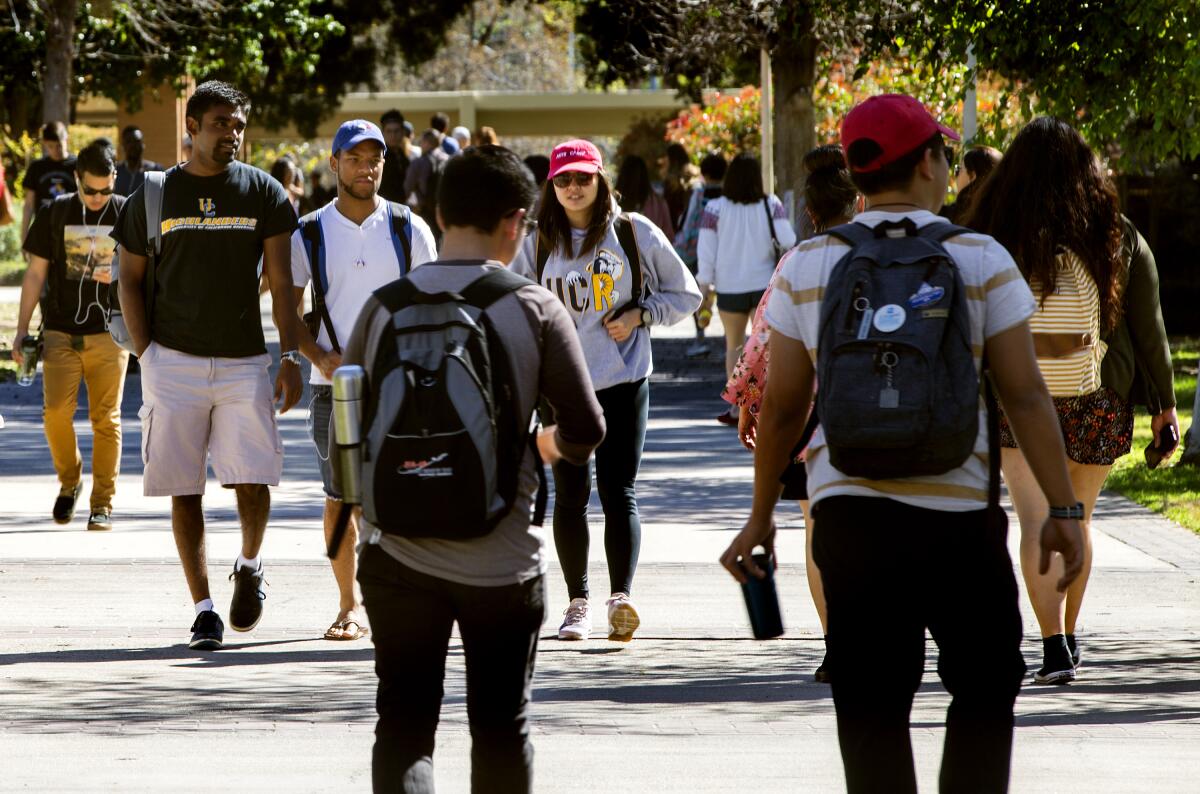UC weighs limited tuition increase for fall 2022

The University of California is weighing a tuition increase for incoming students beginning in fall 2022, but the proposal faced widespread student opposition and sharp questions from regents Thursday.
UC President Michael V. Drake told regents at the virtual board meeting Thursday that the plan would bring financial predictability for families, help struggling campuses maintain educational quality and make a UC education more affordable for many low-income students by raising more revenue for financial aid.
He noted that state funding has lagged behind enrollment growth, increasing by 11% in the last two decades compared with a 67% increase in the number of students served. Overall, per-student funding has declined by 33% during that time, he said.
âIt doesnât take much to recognize that this is just simply not sustainable,â Drake said.
Under the proposal, which regents will vote on in July, annual tuition and fees would increase once for each incoming class and stay unchanged for up to six years. California students entering next fall, for instance, would face an increase of $642 from the current level of $12,570, while those in successive classes would see hikes tied to the rate of inflation.
But the majority of California students pay no tuition and more than 100,000 of them would end up with more help for rent, books and other educational expenses because about a third of all new tuition revenue raised would be funneled into financial aid and increase their grant awards, UC officials say.
The plan, however, faced skepticism and a barrage of sharp questions.
Aidan Arasasingham, UC Student Assn. president, said higher tuition would hurt students who fall through the cracks â LGBTQ students whose parents refuse to pay college costs, immigrants here without legal authorization who donât qualify for in-state tuition and low-income nonresident students hit by fluctuating exchange rates and limited financial aid access.
âIn our eyes, the plan before you today only guarantees a predictability of profit for the university while maligning future students to a predictability of precarity for years to come,â he told the regents.
Regents Eloy Ortiz Oakley and Lt. Gov. Eleni Kounalakis expressed dissatisfaction with UCâs branding of the plan as a way to enhance college affordability. Oakley said tying tuition increases to the rate of inflation, for instance, could result in steep new charges if consumer prices soar.
Some regents questioned whether this was the right time to consider a tuition increase when UC is receiving substantial federal recovery funds and also is expecting more support from the stateâs unexpected surplus of $75 billion.
But Regent Cecilia Estolano said the possibility that more financial aid revenue could help lower the debt burden on students was nudging her from being initially âsuper skepticalâ about the plan to possible support. She also noted that the plan amounted to a progressive tax, which would be a fair way to raise money for the additional faculty, staff, mental health counselors and other support that students need.
âIt makes sense that those who have more ability to pay more, pay more,â Estolano said. âYou canât get the best public education in the world on the cheap and you actually have to pay for it. And you canât educate the people of California from all walks of life without actually investingâ in faculty, staff and support services.
Two campus chancellors â Carol Christ from Berkeley and Kim Wilcox from Riverside â helped make that case.
Christ detailed how her campus, which is heavily dependent on tuition because it lacks a medical center, has struggled to close a structural deficit for the past five years and is now facing threats to its academic excellence without small, reliable tuition increases.
Wilcox, whose students are among the most diverse in the UC system but receive fewer services than many of their peers, said costs rise by 3% every year but his campus canât cover that without more tuition dollars.
The majority of leaders at the UC systemâs nine undergraduate campuses have called for tuition increases as theyâve slashed budgets, dug into reserves, borrowed funds and substantially halted hiring to address what they call one of the worst financial crises theyâve ever collectively faced, fueled by the pandemic. Regents have increased tuition just once since 2011.
Drake, who oversaw a similar tuition plan at his previous presidential posting at Ohio State University, said âreal world experienceâ showed it increased financial aid for students and lowered their debt burdens.
âUC has been a national leader in providing opportunities for students from all income levels,â he said, âand now we can be an adopter of a model that creates stability and predictability for all of our students and for the university.â
Board chair John A. Pérez told regents that they can always go back and revisit the tuition plan if it doesnât deliver the expected benefits.
More to Read
Sign up for Essential California
The most important California stories and recommendations in your inbox every morning.
You may occasionally receive promotional content from the Los Angeles Times.











